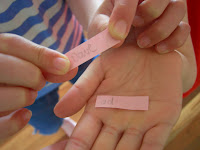 Lisa McKay's debut novel, my hands came away red, has impacted me on many levels and I encourage everyone to read it as soon as they can. A fellow Aussie, Lisa could hardly say no when I pestered her for an interview so enjoy reading about an Aussie girl made good in the States, in her career as a forensic psychologist and now, as a talented and compassionate author.
Lisa McKay's debut novel, my hands came away red, has impacted me on many levels and I encourage everyone to read it as soon as they can. A fellow Aussie, Lisa could hardly say no when I pestered her for an interview so enjoy reading about an Aussie girl made good in the States, in her career as a forensic psychologist and now, as a talented and compassionate author.
Here are Lisa's thoughts:~
ON WRITING...
Please share some of your writing/publishing journey with us
I could write a book on that alone – although it probably wouldn’t be that interesting, come to think of it. In short, I decided to write this book when I was 18. I took me until I was 25 before I wrote anything that seemed to “work” and another four years after that before I had a complete first draft. In comparison, the publication process was actually quite smooth (so smooth my editor has warned me not to tell this story at writer’s conferences, should that time ever come, as he says people will hate me and there might be death threats). I submitted the manuscript unsolicited to three publishing companies and five agents and ended up signing a contract with the first publishing company I had queried.
Why Christian fiction?
I never set out to write “Christian fiction” – I just wanted to tell a story about a girl who collides with some of the harsh realities of this world we live in, and has to confront a lot of questions about meaning and purpose and faith. Although I started by submitting to Christian publishing companies I wasn’t at all sure they would be interested because the story is so “gritty” in places. On the other hand I thought secular publishing companies wouldn’t want it because (as one of my friends said) “God does get mentioned an awful lot.” I’m so thankful it’s found a home, and the team at Moody Publishing has been a dream to work with.
What kept you busy before the writing bug bit?
Studies, mostly. I was a full time student and trying to figure out what on earth I should be doing with my life next (a question I still ask regularly).
Are you planning to write another book?
Yes. I’m mulling over fiction ideas. I think I have one I’m just about ready to start working on in the next couple of months. I’m also thinking about some non-fiction ideas.
You have a full time job as a forensic psychologist involving a lot of travel ~ what on earth does a “regular” writing day look like for you?
A regular writing day is usually a weekend day at the moment. I try hard to reserve Sunday afternoons and evenings for writing – and also write at least one or two evenings a week. It’s challenging. That rhythm works well for writing essays – which are much shorter and self-contained pieces – but could be a lot more difficult in terms of writing another novel. We’ll see.
On my hands came away red...
How was this story placed on your heart?
I was 18 and preparing to go on my own short-term mission trip to the Philippines when I read a story in the Washington Post about pirates in South East Asia. I wondered what would happen if a mission team ran into these pirates, and why it seemed like to me there were so few stories about Christians having their faith tested by contemporary events (as opposed to stories set hundreds of years ago or in the future). And I decided I would write a book that explored something like that. Over time the location and the issues in the story changed. Pirates never quite make an appearance in “Hands” – although they are mentioned.
What was your favourite scene to write?
It's too hard to pick just one! So here are two favourites. I loved writing all the scenes with Jip and Kiki in them because they usually made me laugh. I also really liked writing the near-drowning scene - there was something about trying to capture that experience through the eyes of the narrator herself that was really fascinating.
I love that Cori is an Australian character ~ did you ever contemplate ma king her American?
king her American?
Nope, and one of the reasons (although not the only one) is very practical. The book is written in the first person, and I would find it very difficult to erase all the Australianisms from my speech if I was trying to write from the point of view of someone who was born and raised in the States.
Obviously your work impacted the storyline - to what extent?
It’s interesting how the strands weave together. While the vast majority of the first draft of this novel was written before I started working at the Headington Institute, I do think my study and working experiences with trauma prior to that gave me additional insight into various characters reactions and the sorts of existential questions that are often raised by highly traumatic experiences.
Any ideas who you might cast in a movie of the book?
Wow. No, not really. I've been so busy writing I haven't watched too many movies lately so I'm not up on young actresses and actors. Cori would have to have an Australian accent though J.
Many of the scenes in the book are emotionally exhausting - how did you cope writing them?
On some days, and with some scenes, it was very difficult. Writing the first massacre scene, for example, floored me emotionally for days. I spent a fair bit of time in and around writing many of the scenes in this book feeling some combination of dazed, desperate, despairing, and exhausted. Yeah, I know, it makes writing sound really fun!
When I was working on this book I rarely wrote for more than five hours in a single day. That was generally about my limit for how long I could sit with that intensity. Exercising and reading something very different from what I was working on - something light and fluffy – and prayer, and spending time with other people also helped counterbalance some of the heaviness.
What impact do you hope this book has upon the reader?
For starters, I would love for people to be captivated by this story and find it compelling and moving and authentic. I didn’t write it only because I wanted to entertain, but that’s part of it.
I do hope, however, that people are not only entertained but also challenged. Challenged to think deeply about some of the hard questions the characters grapple with, and also challenged to learn more about the reality of the need and hardship that exists in so many places in Indonesia and elsewhere. Ultimately, it would be even better if that translated into action – that people ended up encouraged to contribute to meeting those needs in small or big ways - financially, practically, or in other ways.
ON MATTERS PERSONAL...
Do you read Christian fiction yourself? If so, some favourite authors or books both Christian and/or secular?
I read a lot – both Christian and secular. Some of Christian fiction books I’ve really enjoyed recently include Feeling For Bones by Bethany Piece (a fellow Moody author), The Dead Don’t Dance by Charles Martin, and The Secret Life of Becky Miller by Sharon Hinck. Additional books I’ve really enjoyed recently include Shantaram by Gregory David Roberts, Love Walked In by Marisa de los Santos, The Beautiful Things That Heaven Bears, by Dinaw Mengestu, and Gilead b y Marilynne Robinson.
y Marilynne Robinson.
What are you reading at the moment?
Anne Lammott’s Bird by Bird.
Favourite movie and favourite line from a movie?
I thought first of the movie The Princess Bride – and then I thought of a particularly apropos quote – “Never get involved in a land war in Asia.” But I can’t really say it’s my favourite.
My favourite that I’ve seen recently is Amazing Grace.
“When people speak of great men, they think of men like Napoleon - men of violence. Rarely do they think of peaceful men. But contrast the reception they will receive when they return home from their battles. Napoleon will arrive in pomp and in power, a man who's achieved the very summit of earthly ambition. And yet his dreams will be haunted by the oppressions of war. William Wilberforce, however, will return to his family, lay his head on his pillow and remember: the slave trade is no more.”
Who inspires you?
People like Wilberforce inspire me. If there is any shred of truth in some of the stories about him, he was torn between his desire to live a quiet life of contemplation and his sense that he was being called to fight for a cause – the abolition of the slave trade – on a far larger stage.
I’m privileged to know many people around the world who have sacrificed in big and small ways to work in some way for human rights, poverty alleviation, health care, and education… to work for good. They all inspire me.
How many countries have you lived in and where do you feel most at home?
I’ve lived in Australia, Canada, the US, Bangladesh, Zimbabwe, Indonesia, the Philippines and Croatia. How does the song go, though? “I still call Australia home” J. With one exception, my immediate and extended family all live in Australia and it’s the country I have considered home my entire life.
Please share some of your faith journey...
I became a Christian very young – I can’t remember a single point where I made the “decision” to believe as a child. As an adult, however, I have grappled with the same questions that haunt various characters in Hands, and the paradox that seems inherent in the concept of loving, omnipotent, God and the flourishing of suffering and evil. Sometimes I feel that the older I get, the fewer “certain answers” I feel there are in life and in faith. But, so far, even when my mind has been most occupied in tripping over it’s own questions there has still been a deeper river running through my soul, bearing me along, refusing to relinquish me permanently to the rapids of denial, doubt, and fear.
Some essential questions for an Aussie living in Los Angeles!
What was the most difficult cultural adjustment to living in the US?
I don't know if this was the most difficult, but it was one of the difficult ones - is the general difference in sense of humour and the use of sarcasm. I had to learn that people would take me seriously if I said something with a straight face, no matter how ridiculous it was - and then we'd both be embarrassed when it turned out I was teasing. I am less sarcastic here, especially with people I don't know well.
Have you kept your Aussie accent?
I'm trying! I fought hard to get that accent back after mostly living overseas between the ages of 7 and 19, and I am fighting hard to keep it now!
Favourite place to visit in the US
I have problems narrowing things down – so instead of one – here’s five favorite place s: Yosemite National Park (it's just fantasy novel beautiful). The Santa Monica pier (I feel like I'm starring in a movie when I step onto it). Old Town Pasadena (it's actually not very old, but it's cute nonetheless). Washington DC (my sister lives there). Hawaii (that place is just tropical island idyllic)
s: Yosemite National Park (it's just fantasy novel beautiful). The Santa Monica pier (I feel like I'm starring in a movie when I step onto it). Old Town Pasadena (it's actually not very old, but it's cute nonetheless). Washington DC (my sister lives there). Hawaii (that place is just tropical island idyllic)
Do you still eat vegemite on toast for breakfast or have you converted you to waffles?!
Neither. I'm a raisin bran and 1% milk girl. Except when I haven't had any time to grocery shop (which has been happening a lot recently) and then I'm half-ashamed to admit I'm a "Starbucks for breakfast" girl. I have yet to see them serving any “vegemite scones” at starbucks, but I live in hope.
Any last words...
Thanks for reading this far! If you’re interested in finding out what I’m up to, visit my website at www.lisamckaywriting.com - where you’ll find a number of my essays. And if you’re if you are interested in learning more about ways to contribute to poverty alleviation and justice advocacy in Indonesia or other areas of the world I urge you to check out the websites of International Justice Mission (www.ijm.org) and Opportunity International (www.opportunity.org). I am donating my author royalties from the sale of “Hands” to these two organizations.
Lisa ~ it has been a fair dinkum delight to interview you - LOL! Thanks so much for giving of your time. I will be holding you to that next novel idea :)
To read my review, click here.my hands came away red is available now and published by Moody. For Aussies, pre order from Koorong by clicking here - you won't be disappointed!
























































